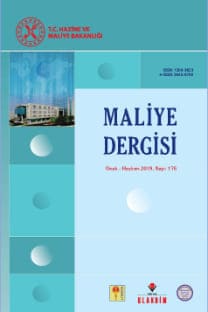Türkiye ve Avrupa birliği ekonomilerinde yenilikler ve ar-ge'nin teşviki: Karşılaştırmalı bir değerlendirme
The innovations and r&d incentives in the economies of Turkey and EU: A comparative assessment
___
Aghion, P. ve Howitt, P. (1992), A Model of Growth Through Creative Destruction, Econometrica, March, 60(2), 323-351.Aykar, Ö. (2014), 6518 sayılı Torba Yasa ile Vergisel Konularda Yapılan Düzenlemeler, http://www.alomaliye.com/2014/ozkan-aykar-6518-sayili-yasa- ile-vergisel-konularda-yapilan-duzenlemeler.htm (Erişim Tarihi: 20.05.2014).
Can, F. (2007), Dünyada ve Türkiyede Araştırma Geliştirme Faaliyetlerine Yönelik Vergisel Teşvikler, Karadeniz Teknik Üniversitesi, SBE, Yayımlanmamış Yüksek Lisans Tezi, Trabzon.
Carvalho, A. (2011), Why are Tax Incentives Increasingly Used to Promote Private R&D? Working Paper (4), Portugal: CEFAGE-UE, http://www.cefage.uevora.pt/ en/content/download/2320/31134/version/1/file/2011_04.pdf (Erişim Tarihi: 18.05.2014).
Çelebi, A.K. ve Kahriman, H. (2011), Avrupa Birliği Ülkeleri ve Türkiye‟de Ar-Ge Faaliyetlerine Yönelik Vergi Teşvikleri ve Bunların Karşılaştırmalı Analizi, Maliye Dergisi, 161, 33-63.
Deloitte (2013), 2013 Global Survey of R&D Tax Incentives, http://www.deloitte.com/assets/DcomUnitedStates/Local%20Assets/Documents/ Tax/US_Tax_RD_Global_RD%20Survey_March_2013.pdf (Erişim Tarihi: 11.05.2014).
European Commission (EC) (2009), Design and Evaluation of Tax Incentives for Business Researchand Development, http://ec.europa.eu/invest-in research/pdf/download_en/tax_expert_group_final_report_2009.pdf (Erişim Tarihi: 12.05.2014).
European Union Scoreboard (2013), European Commission, Belgium.
Eurostat (2013), Eurostat Regional Yearbook 2013, European Commission.
Evci, C. (2004), Ar-Ge Vergi Teşvikleri, AÜ, SBE, Yayımlanmamış Yüksek Lisans Tezi, Ankara.
EY (2014), Worldwide R&D Incentives Reference Guide 2013-2014, http://www.ey.com/Publication/vwLUAssets/EYWorldwide_R_and_D_incentiv es_ reference_guide/$FILE/EY-Worldwide-R&D-incentives-reference-guide.pdf (Erişim Tarihi: 12.05.2014).
Fontan, J.M., Klein, J.L. ve Tremblay, D.G. (2004), Innovation and Society: Broadening the Analysis of the Territorial Effects of Innovation, Research Note No: 2004-07A, http://www.teluq.uquebec.ca/chaireecosavoir/pdf/NRC04- 07A.pdf (Erişim Tarihi: 08.04.2014).
Freeman, C. (1982), Innovation and Long Cycles of Economic Development, Paper Presented at the International Seminar on Innovation and Development at the Industrial Sector, Economics Department, University of Campinas, Campinas (25-27 August), 1-13.
Griffith, R., Redding, S. ve Reenen, J.V. (2002), Mapping the Two Faces of R&D: Productivity Growth in a Panel of OECD Countries, The Institute for Fiscal Studies, Working Paper, 02/00 London, United Kingdom: The Institute for Fiscal Studies.
Gürak, H. (2006), Önce Bilgili İnsan-Ekonomik Büyüme ve Refahın Gerçek Kaynakları Olan: Üretken Bilgi (Teknoloji) ve Nitelikli Emek Üzerine, http://www.elelebizbize.com/e-kutuphane/hasangurak/Once%20Bilgili%20 Insan.pdf (Erişim Tarihi: 08.04.2014).
Hospers, G.J. (2003), From Schumpeterto the Economics of Innovation, Briefing Notes in Economics, March-April, 56, 1-12.
Kalkınma Bakanlığı (2013), Onuncu Kalkınma Planı (2013-2018), http://www.kalkinma.gov.tr/Lists/Yaynlar/Attachments/518/OnuncuKalk%C4% B1nmaPlan%C4%B1.pdf (Erişim Tarihi: 12.05.2014).
Kazgan, G. (2004), İktisadi Düşünce veya Politik İktisadın Evrimi, 11. Baskı, Remzi Kitabevi, İstanbul.
Lee, J.W. ve Yu, B.G. (1998), An Endogenous Growth Model Approach to the Korean Economic Growth Factors, http://faculty.washington.edu/karyiu/confer/ sea05/papers/lee_yu.pdf (Erişim Tarihi: 10.03.2014).
Lichtenberg, F.R. (1992), R&D Investment and International Productivity Differences, NBER Working Paper, No. 4161.
OECD (2002), Tax Incentives for Researchand Development: Trends and Issues, OECD Science Technology Industry (STI) Paris.
Park, W.G. (1995), International R&D Spillovers and OECD Economic Growth, Economic Inquiry, 33, 571-91.
Porter, M.E. ve Stern, S. (2000), Measuring the Ideas‟ Production Function: Evidence from International Patent Output, NBER Working Paper, No. 7891, Cambridge: Massachusetts: National Bureau of Economic Research.
Price Waterhouse Coopers (2008), Belgium R&D Tax Incentives, http://www.pwc.be/en_BE/be/pharma/Belgium-R-D-tax-incentives-PwC-08.pdf (Erişim Tarihi: 12.05.2014).
Sylwester, K. (2001), R&D and Economic Growth, Journal of Knowledge, Technology & Policy, 13(4), 71-84.
TÜSİAD (2009), Mevcut Ar-Ge Düzenlemelerinde Karşılaşılan Sorunlar, Çözüm önerileri ve Başarılı Ülke Uygulamalarına İlişkin Görüş Belgesi, Aralık, İstanbul.
Warda, J. (2001), Measuring the Value of R&D Tax Treatment in OECD Countries, STI Review No.27: Special Issue on New Science and Technology Indicators, OECD Publishing, http://www.oecd.org/sti/37124998.pdf (Erişim Tarihi: 11.05.2014).
Yuen, P.H., Poh, K.W. ve Mun, H.T. (2009), The Impact of R&D on the Singapore Economy: An Empirical Evaluation, The Singapore Economic Review, 54(1), 1-20.
- ISSN: 1300-3623
- Yayın Aralığı: Yılda 2 Sayı
- Başlangıç: 1973
- Yayıncı: Hazine ve Maliye Bakanlığı
MUHAMMET ÖZCAN, ENSAR AĞIRMAN, ÖMER YILMAZ
Türkiye'de kamu harcamalarının ekonomik büyümeye etkisinin sınır testi yaklaşımı ile analizi
ESRA KABAKLARLI, Perihan Hazel ER
Politik istikrarsızlığın bütçe dengesi üzerindeki etkisi: Türkiye örneği
Türkiye'de yaratıcı ve kültürel sektörlerin yapısı
Luciana LAZZERETTİ, Francesco CAPONE, İ. Erdem SEÇİLMİŞ
Araştırma-geliştirme harcamaları ve ekonomik büyüme ilişkisi: Panel veri analizi
Ar-ge, inovasyon ve kalkınma ilişkisine yönelik bir literatür taraması: Kuramsal özet
Finansal kalkınma sürecinin ar-ge harcamaları üzerindeki etkisi: Schumpeter haklı mıydı?
GÖNÜL YÜCE AKINCI, MERTER AKINCI, ÖMER YILMAZ
Kamu iktisadi teşebbüslerinde ar-ge ve inovasyon faaliyetleri: Genel görünüm1
Patentlerin değerlemesi ve muhasebeleştirilmesi
Ayten ERSOY, AYŞE NUR BUYRUK AKBABA
Türkiye'de rekabet, ar-ge, inovasyon ve ekonomik büyüme: Nasıl bir ilişki söz konusudur?
